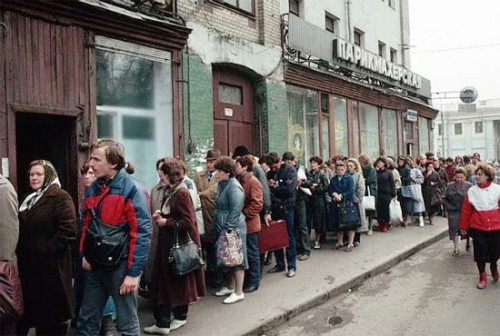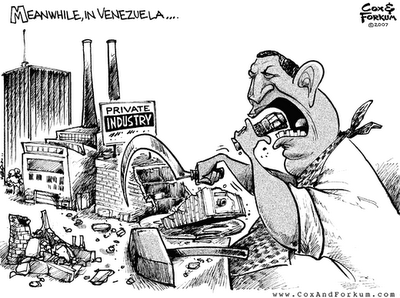Saturday, September 19, 2009
Food is a 'right'. Nationalize it?
Let's see what happens when everything becomes a 'right'.
by StFerdIII

The inevitable result of the mommy-state culture is the creation of an endless series of 'rights' and the imposition of state control to 'protect' such rights. Rights should of course be earned, not given. However once government determines what are 'rights' and begins the process to nationalize and 'welfarize' markets and individual choices such as health-care under the rubric of 'a right'; there is no logical or consistent argument against the nationalization of anything else. If government-rationed health care is a 'right', why not government-rationed food and 'food-care' ? Food is a far more basic 'right' than health. So let's try it.
What would happen if you nationalized food production and distribution under the aegis of the usual litany of political-newspeak nonsense: saving the children's future; the 'war' against poverty; fairness; equality or helping mother earth?
Any of the cognitive distortions used to 'sell' other projects to expand governmental power could be applied to food nationalization. And throughout history it was. The destruction by Lenin and Stalin of the independent Russian and Ukrainian farmer 'class', called the 'Kulaks', and the replacement of a market for food by government control was 'sold' using the rational that any aspect of any market in any sector, was a part of capitalism and had to be resisted and destroyed.
An Italian consul wrote home about the evil paranoia of Leninist-Stalinist doctrine in which state owned food collectives were investigated and many of their managers killed or tortured when the meagre output of the state owned farms did not match governmental expectations:
"The enemy is everywhere and must be fought on innumerable fronts in tiny operations: here a field needs hoeing, there a few hundredweight of corn are stashed; a tractor is broken here, another sabotaged there; a third has gone astray. . . . A depot has been raided, the books have been cooked, the directors of the kolkhozy, through incompetence or dishonesty, never tell the truth about the harvest . . . and so on, infinitely, everywhere in this enormous country. . . . The enemy is in every house, in village after village."
The Russian fascist disposition to destroy any vestige of a market led of course to massive famines, poor crops, no food supply, social and political unrest, millions of dead and the destruction of generations of Russians and Eastern Europeans. All this because of Marxist-Leninist ideology that markets are bad; communalism is moral; and once a state backed peasantry in alliance with a ruling gang, owned the means of production, human harmony would ensue.
If one was to nationalize food supply and distribution we would see some revolting consequences, many of them similar to experiments tried in Russia and elsewhere:
-A government take over of food supply and distribution [in some markets this is already in effect though in a mild form using 'supply commissions' and the like] leading to wage caps on farmers; and higher prices for consumers.
-Consumer prices would inevitably be capped and controlled by a commissariat.
-A massive, disastrous reduction would have to follow in domestic food production as farmers and others exited the food market
-The nationalization of food retail stores would lead to a chaotic and large reduction in stores, access points, product available for sale; and choice.
-Social unrest has to follow a limitation on food availability, the creation of lines to buy food, and the annihilation of literally millions of jobs associated with the food industry in the supply and consumer chains. Perhaps even a revolution ?
-Huge debts and new taxes would be needed to pay for the mounting costs of government food supply and the inevitable costs associated with inefficient supply and marketing of food.
-People would be severely limited in what foods they could buy.
-Imports would need to soar to feed the population to neuter a revolution.
-Governments eventually would be forced out of the food supply and retailing markets leading to a re-privatization of the food industry.
The net result of nationalizing food would be huge debts, extraordinary unemployment; a sharp reduction in food intake which could lead to deaths; and the destruction of the food supply and retail markets which could take decades to repair. Innovation, food choice, supply efficiencies, and access would all be denied – not to mention the right to make profits, to work, and to consume.
In essence nationalizing food to grant the mass a 'right' leads to the inevitable destruction of far more concrete and natural law rights such as choice, availability, competition, the profit-motive and individual freedom.
If that is true for socializing food, why is not true for the socialization of health-care?
Selling a political program of repression and dislocation by appealing to emotions and using words such as justice and equality is simple. Many will fall for it. What is less straightforward is dealing with the carnage and chaos afterwards. Nothing which is nationalized by definition, can be moral and efficient.
One of the more preposterous claims by those who shriek that government health-care is the ONLY solution to providing health services to the 'poor and the masses' is that in no other market or sector of reality does a government run industry work efficiently, fairly, morally or price-competitively. The rigidities of government incompetence are legendary – no capital and labor mobility; no innovation; little access; and rationing or denial of services. It might be easy political posturing – 'I support socialised health care because I believe that all people have a right to treatment and medical aid....', but the reality of what transpires in the real world, does not match the airy utopian moralizing and self-certainty.
Mindless rhetoric around government-ownership of any sector is about as intelligent as the eco-fascist intolerant who really believes that only he and his cult want clean water, breathable air, and forests. These are nothing more than inane platitudes. The real questions are about the scarcity of resources [an economic issue]; the morality and empowerment of choice [a philosophical issue]; and the creation of a certain culture [a socio-spiritual issue].
When broken down this way, there is little that nationalization offers which is economically intelligent; moral; spiritual or socially viable or satisfying.
